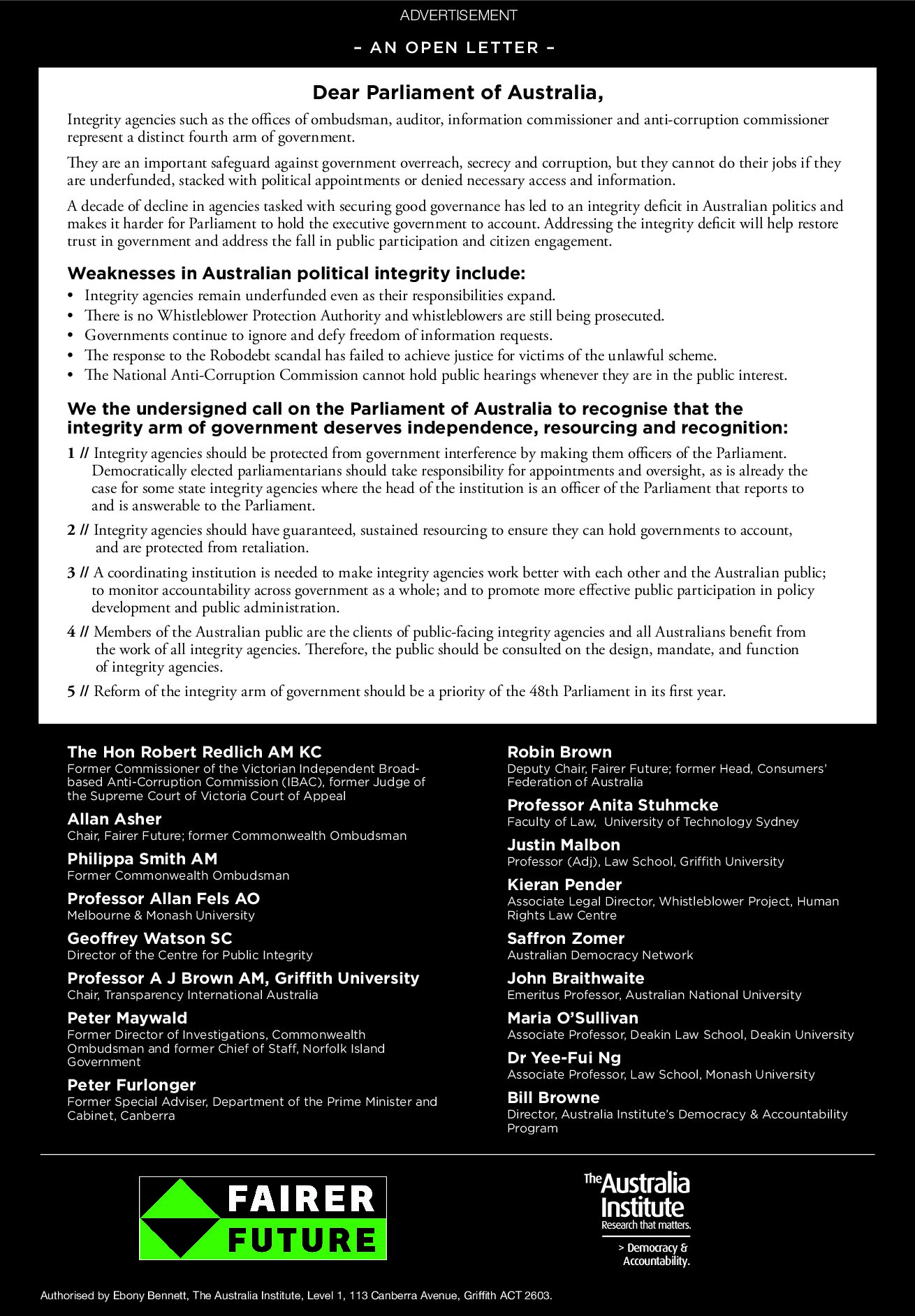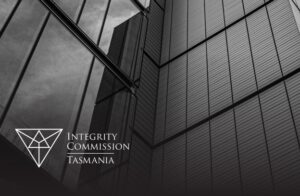Address to the Climate Integrity Summit: Climate Envoy for the Marshall Islands | Tina Stege
Words are only as good as the actions that follow. There’s no integrity in climate ambition without commensurate climate action. Having integrity means keeping our word, and that includes countries like Australia and other members of the G20 transitioning away from fossil fuels and doing so now.
Iọkwe and greetings to you all.
Koṃṃool [thank you] to the Australia Institute for inviting me to speak today.
Unfortunately, I could not join you in person for this extremely timely Climate Integrity Summit – timely because integrity is the fault line across which the success or failure of our collective effort to mitigate, adapt, and address the effects of this global crisis will be decided.
But before I speak about the global crisis, let me describe for you the domestic crisis that is washing up and over our doorstep in the Marshall Islands. We are an atoll nation with islands resting barely two meters above sea level.
Last week, Marshallese people across the country posted videos on Facebook, our 21st-century iteration of the coconut wireless, of flooding from king tides. Boys evacuated from the dormitory at Jaluit High School filmed school fields transformed into lakes and garden plots drowned in saltwater.
On Kili Island, Bikinians – the same Bikinians displaced by US nuclear testing in the 1940s and fifties – posted photos of their airfield completely submerged. Kili has no harbour and is extremely difficult to access by sea.
Each time king tides submerge the airport and cut off the community, it nicks at the ever-present scar of exile and displacement that is the legacy of the testing.

On Majuro Atoll, my home, the water threatened the newly completed track and field complex where we will be hosting the Micronesian games this summer.
We had no storm or high winds to contend with when this happened – no rain at all as we are experiencing El Nino drought-like conditions.
The flooding we are seeing now is due to sea level rise that has already occurred due to climate change, and the sea will only continue to rise. The question of how much and how fast depends on whether all countries, but particularly those who are the major emitters, will lead with integrity and vision.
The integrity to deliver policies and plans now to implement commitments already made and the vision to set ambitious targets over the next two years to underpin safety and security for us all.
We know that the Marshall Islands is not alone anymore in feeling the effects of climate change, flooding, drought, fires, mass coral bleaching and migrating fish stocks are all familiar to you too.
We are all running out of time.
The science tells us what we need to do to respond. Systemic transformation across all sectors is required and it must happen this decade.
The root of this crisis lies in the ground.
You cannot solve a problem without getting to its root cause.
For this reason, the Marshall Islands fought tooth and nail for a fossil fuel phase-out last year alongside our Pacific Island colleagues. The result last December at COP28 in Dubai? Your country sat alongside mine and over 200 other countries to agree to transition away from fossil fuels in line with 1.5 degrees Celsius.
Australia was a main proponent of this language having agreed similar language at the Pacific Island Forum meeting just prior to COP.
And yet words are only as good as the actions that follow.
There’s no integrity in climate ambition without commensurate climate action. Having integrity means keeping our word, and that includes countries like Australia and other members of the G20 transitioning away from fossil fuels and doing so now.
And yet fossil fuel projects are continuing and expanding.
The government has approved new coal mines, the most polluting of the fossil fuels. It has supported the fossil fuel industry to develop carbon-intensive offshore gas fields. It’s allowed fracking. These policies mean that Australia continues to have one of the highest contributions to global emissions, not only through its emissions at home but through its exports of coal and liquified natural gas, which represented 20% of all thermal coal and LNG shipped internationally last year.
Australia’s Role
Australia is also not setting sufficiently high targets.
Its most recent nationally determined contribution in December 2023 was rated as insufficient by climate analytics. In the Marshall Islands as in many of the other large ocean states in our beautiful Blue Pacific region, leading by example on ambition is a hallmark of our climate policies and plans.
The Marshall Islands was one of the very first countries to submit an enhanced nationally determined contribution back in 2018, followed closely by an electricity roadmap that laid out our pathway to transitioning away from fossil fuels and scaling up renewables.
Implementation is challenging, especially given financing and capacity constraints. Nevertheless, we remain fully committed to high ambition and action because we know that our security, our safety, our very survival depend on it. The crux of the problem is that our security, our safety and our very survival depend even more on the climate ambition and actions of countries like yours.

Certainly, transitioning energy and other systems in Australia presents vastly different challenges and opportunities, but you have all the tools that we lack at your fingertips.
Access to finance, to raw materials, human resource capacity, and technology.
We need you to join the rest of our Pacific family in leading by example and deploying these tools for the safety and security of all. We will be looking to Australia and other governments that are lagging behind to prepare ambitious new targets in line with 1.5 C ahead of COP30 in Brazil.
We recognise that your current government has stepped up outreach in the region. In 2021, Australia opened its embassy in the Marshall Islands as part of its broader Pacific step-up commitment to establish a presence in each Pacific Island forum country. With that dedicated presence, we have seen closer cooperation and a deeper understanding of our unique needs, particularly in terms of adaptation.
Australia is a key supporter in the rollout of the initial phase of our national adaptation plan, providing 2.5 million Australian dollars over five years of flexible, programmatic and predictable funding.
This is very much appreciated and we hope that support will not only be extended but enhanced because the costs of climate change in my country are staggering.
Our national adaptation plan alone estimates that 1 billion US dollars will be needed to provide comprehensive coastal protection of both urban centres in the Marshalls, up to 20 inches of sea level rise and the cost of protecting all atolls to the two metres of sea level rise that we can expect without drastic mitigation action, is 35 billion.
Financing Climate Resilience
This brings me to my final point, which is on finance. This is an important year in the climate process because we need to agree on a new goal for climate finance and it is clear that we need a drastic scale-up of public grant funding as well as to explore and implement innovative forms of finance like levies on fossil fuels that could provide new revenue for climate needs.
There is a growing recognition that the financial architecture built in the wake of the world wars is not equipped for the current moment.
The Pacific is active in discussions on where the gaps are greatest, particularly for small island developing states. We look to Australia to work closely with us as we push for the necessary reforms to unlock financing that supports development on a livable planet, especially for the most vulnerable.
A starting point must be repurposing money that is working against the interest of a safe future, which is what subsidies for fossil fuels do.
There is no sane reason to fund industries that are already profiting from our destruction, and we will look with scepticism on any developed country that tells us there is no money to be found for increases in climate finance when they continue to cut deals for their fossil fuel industries.
A great deal of Australia’s money is going towards the very fossil fuels that they’ve agreed to transition away from. Last year 11.1 billion worth of spending and tax breaks went to fossil fuel industries.
According to the Ki Mua report on Decarbonisation in the Pacific, eight Pacific countries could transition their economies to 100% renewables for less than a seventh of that amount.
As the impacts of the climate crisis pile on, we can’t afford any more doublespeak.
We can’t afford for countries to say that they’re committed to the future of violence and continue to expand fossil fuels.
We can’t afford for countries to say there’s no money to be found and then find it for the subsidies that are destroying our world.
We can’t afford sympathy for the loss and damages we’re experiencing when everyone knows that sympathy won’t foot the bill.
Integrity means doing what you say you’ll do and it’s what the world needs to take on this crisis.
Thank you. Kommol tata.
— Tina Stege, Climate envoy for the Marshall Islands at the Australia Institute’s Climate Integrity Summit 2024 (via video link)
Between the Lines Newsletter
The biggest stories and the best analysis from the team at the Australia Institute, delivered to your inbox every fortnight.
You might also like
Open letter calls on newly elected Parliament to introduce Whistleblower Protection Authority, sustained funding for integrity agencies to protect from government pressure.
Integrity experts, including former judges, ombudsmen and leading academics, have signed an open letter, coordinated by The Australia Institute and Fairer Future and published today in The Canberra Times, calling on the newly elected Parliament of Australia to address weaknesses in Australian political integrity. The open letter warns that a decade of decline in agencies
First Nations and Pacific Leaders call Climate Crisis Summit after month of government failures
First Nations, Pacific climate leaders and the community have announced a Climate Crisis Summit in Canberra on Monday 27 October, in response to a month of devastating climate decisions from the Albanese Government.
Underfunded, toothless and lacking transparency – time for a new era of integrity in Tasmania
As Tasmania’s newly elected politicians jostle to form government, new analysis from The Australia Institute shows that a deal to address integrity would be popular among election-weary voters.


